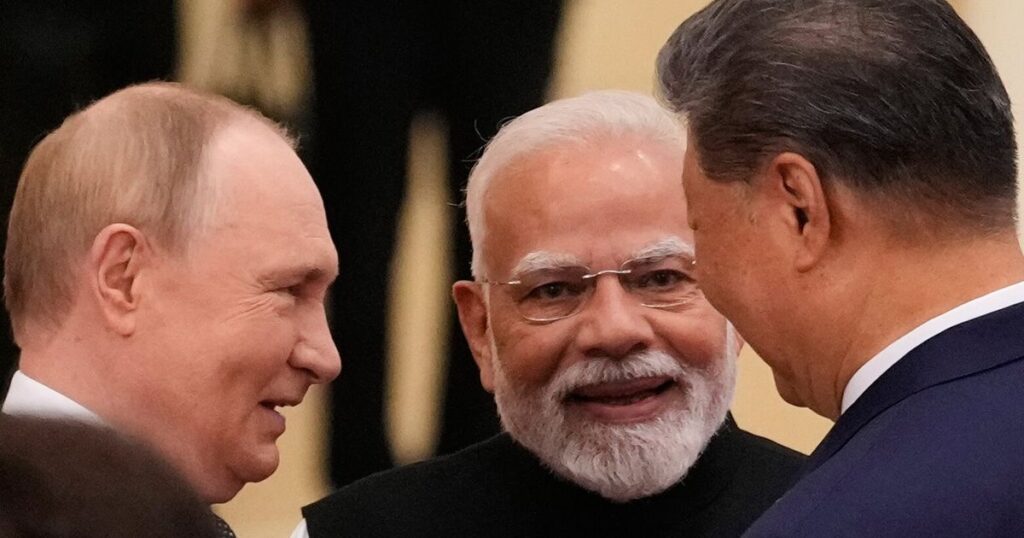BERLIN — When Vladimir Putin attended the annual summit of Eurasia’s main political and security organization three years ago, the Russian president seemed isolated and on the ropes.
China’s leader raised concerns about Putin’s invasion of Ukraine. India’s prime minister pointedly declared, “Today’s era is not of war.” Other heads of state left their Russian counterpart idling alone before meetings. And on the battlefield in Ukraine, Russia’s troops were collapsing in retreat.
Now, Putin’s fortunes have changed — and so has the world.
Nowhere was that more apparent in recent days than in Tianjin, China, where leaders from member states of the Shanghai Cooperation Organization, the Eurasian security grouping, met on Monday alongside heads of state from other countries.
Putin used his stage to publicly blame the West for the war in Ukraine. He gleefully held hands with Prime Minister Narendra Modi of India and erupted in laughs as the pair joined in a huddle with the Chinese leader, Xi Jinping. Leaders from Iran, Nepal, Tajikistan, Turkey and Vietnam glad-handed Putin in private meetings that ran past midnight.
“It felt like the war was accepted in certain ways,” said Maria Repnikova, a professor of global communication at Georgia State University who studies China and Russia. “It’s like back to business and the war was not even present.”
Ukraine’s Ministry of Foreign Affairs, in a statement, called it “surprising” that the summit’s final communiqué made no mention of “the largest war of aggression in Europe since World War II” despite referring to “a number of other wars, terrorist attacks and events in the world.”
The elephant in the room was President Donald Trump, who has helped end Putin’s isolation, both by welcoming him to U.S. soil for the first time in a decade and by clashing with leaders from Brazil, India and South Africa, pushing them closer to Putin.
Trump’s relationship with Modi has unraveled as New Delhi has resisted pressure from Washington to credit the U.S. leader with ending the military conflict between India and Pakistan. Trump has piled tariffs on India in response, singling out New Delhi for buying Russian oil.
The message Modi seemed to be sending, after spending 50 minutes chatting in Putin’s private limousine and warmly embracing the Russian leader in public, was that India had other options.
Since the early days of the war in Ukraine, Russia has tended to its diplomatic relations with nations outside the West, especially China, India and Turkey, lifelines for Moscow’s wartime economy.
“It’s not only that Russia endured 3½ years of difficult war and is still on its feet and still pushing forward, but Russia’s diplomacy has been quite skilled,” said Michael Kimmage, director of the Washington-based Kennan Institute, which focuses on Eurasia.
“Russia has built a network of relationships that matter to the Russian economy, that legitimize the Putin system and that make the war’s impact on Russia smaller than it perhaps otherwise would be,” he said.
Still, the warm reception for Putin has gone only so far. Relations between many European countries and Russia remain in a deep freeze, tempering partners of Russia that rely on trade with Europe. Most have stopped short of recognizing Russia’s territorial claims or backing its war overtly.
But Trump’s disruptive trade wars and mercurial foreign policy have created an opening, as Putin and Xi present themselves as more stable potential partners. Putin, in particular, has been warning about U.S.-instigated chaos for years.
“The Chinese argument, which the Russians are happy to join, is that the U.S. is a source of disorder,” Kimmage said. “It’s not just a meme or an argument now. It is true.”
The meeting in Tianjin will be followed by China’s commemoration of the 80th anniversary of the Japanese surrender during World War II. Putin will stay for the events, which will include a military parade akin to the one Russia staged in May to commemorate victory over Germany. Xi attended the May events.
Despite Putin’s entreaties abroad, some countries that Moscow has long considered part of its “sphere of influence” have seen an erosion of Russian influence.
The Kremlin fielded questions on Monday about when Putin would meet with President Ilham Aliyev of Azerbaijan, who was also in attendance in Tianjin, amid strained ties between Russia and Azerbaijan.
Aliyev and Prime Minister Nikol Pashinyan of Armenia appeared in Washington last month with Trump to sign a peace pledge, with the White House usurping the Kremlin as the traditional interlocutor between the two nations. Putin met with Pashinyan in Tianjin on Sunday.
The Russian foreign minister, Sergey Lavrov, presented the Tianjin summit as an answer to what he called Western efforts to maintain dominance through tariffs and the primary role of the dollar in international trade.
It is now clear, he told Russian state television, that “these competitors have not only grown stronger, but in many respects are already ahead of the historical collective West.”

